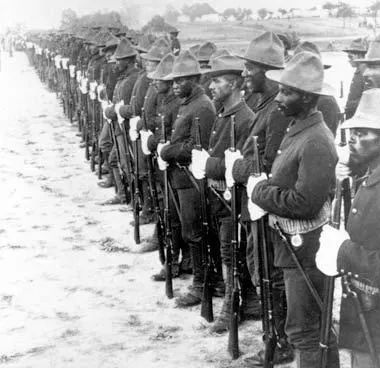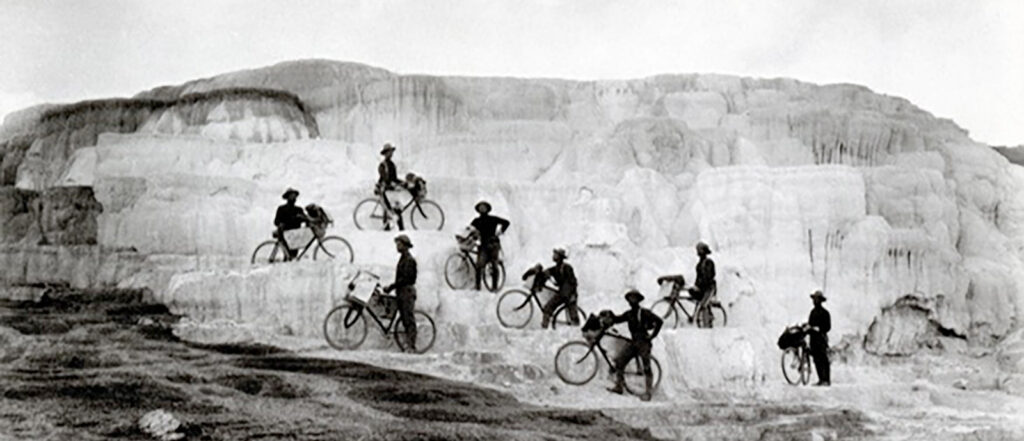“Buffalo Soldier, dreadlock Rasta
There was a Buffalo Soldier
In the heart of America
Stolen from Africa, brought to America
Fighting on arrival, fighting for survival”
Bob Marley and the Wailers’ song “Buffalo Soldier” parallels the history of the Buffalo Soldiers and their fight for their personal survival in the American Indian Wars, to the Black resistance in 1978. For quite a long time this reference was one of the most visible mentions of their history. The lyrics are a truncated history of the Black experience in America and an illustration, through Marley’s eyes, of the ways the United States has taken advantage of Black men. The most culturally famous mention of the Buffalo Soldiers is a great jumping-off point to dive into the history of this extraordinary group of men.

In 1866, Congress established all-Black regiments to serve in the Civil War. After the Civil War, these regiments were tasked with helping rebuild the country and with fighting in the “Indian Wars” in the western United States. The troops were referred to as “buffalo soldiers”, while the origin of this moniker is widely disputed, the soldiers “considered the name high praise.” The nickname stuck and soon was adopted by many all-Black regiments. The Buffalo Soldiers helped create infrastructure for the quickly growing population in the west.
“In addition to their military duties, the Buffalo Soldiers also served as some of the first caretakers of the national parks.” Between 1891 and 1913, before the advent of the National Park Service, the U.S. Army served as the official administrator of Yosemite and Sequoia National Parks. The Buffalo Soldiers completed many significant projects that we would recognize as the current work of modern day Park Rangers: building trails and fighting wildfires.

Teton Science Schools has a long-standing relationship with the National Park Service (NPS). Each of our program areas collaborates with the National Parks in a unique way. Field Education works directly with the National Park Service to help usher in the next generation of Park Rangers. TSS Field Education, Grand Teton National Park, and the American Conservation Experience have worked in partnership to create a week-long orientation for college students from groups that are historically underrepresented in National Park Service careers. The orientation provides diverse students with an experiential opportunity that exposes them to various career paths within the NPS, while participating in a variety of workshops, field trips and recreational activities within a national park. After successful completion of the orientation, students will have the opportunity to work in a variety of summer positions in parks throughout the NPS.
Three themes – Connections, Diversity and Legacy – form the foundation of the NPS Academy orientation. NPS Universal Competencies are integrated throughout the three themes. Communications Skills, Problems Solving Skills and Fundamental Values are the core Universal Competencies that appear throughout all program themes to help prepare students for long-term success beyond the NPS Academy orientation.
The Diversity theme is intended to give the students an understanding of the history of race in the National Park Service, as well as current issues and social justice efforts. It also allows time for students to explore and express personal thoughts, ideas, and connections to diversity, including a full day in the outdoors with a focus on exploration, community building, and reflection. When students have the space to explore their own roots, the principle of nature as a place for connection and reflection is reinforced.
While the Buffalo Soldiers were disbanded on December 12, 1951, their indelible mark lives on in American history. They were not only soldiers in the army; they were the first stewards of our natural treasures, the newly created national parks. As TSS helps to prepare individuals for a career in the Park Service, we hope to impart the importance of the breathtaking natural resources found in national parks, as well as the complex and layered diversity of the people who have interacted in these places.
If you are interested in the NPS Academy, learn more at National Park Academy
To learn more about the Buffalo Soldiers check out these resources from the National Park Service:
National Park Service Buffalo Soldiers
National Park Service Yellowstone: Buffalo Soldiers


